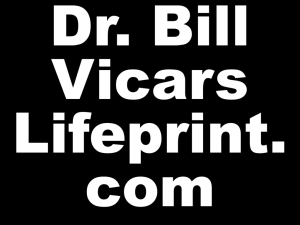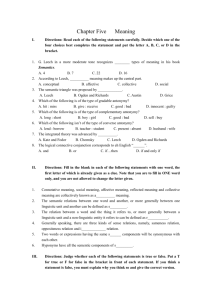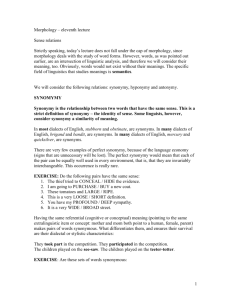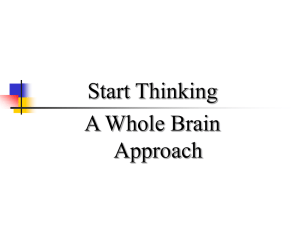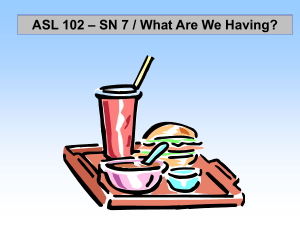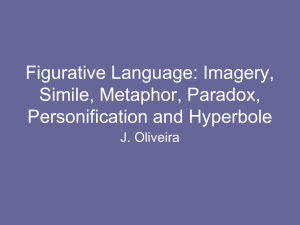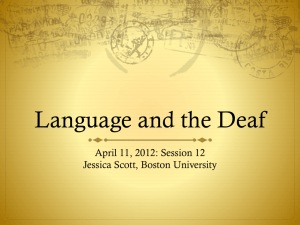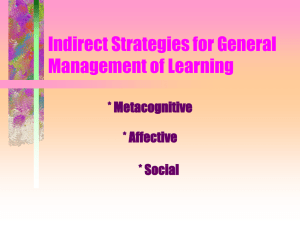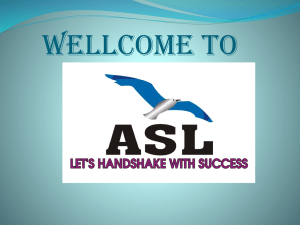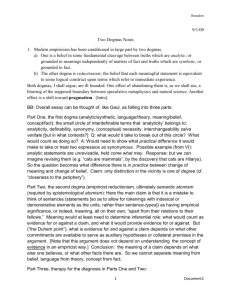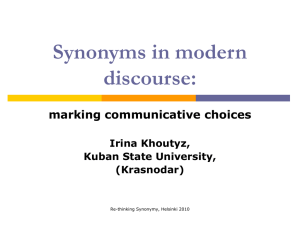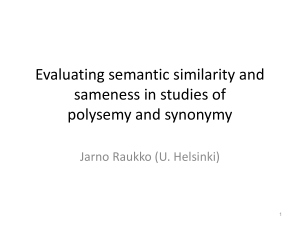Linguistics-5ed-p151-160
advertisement
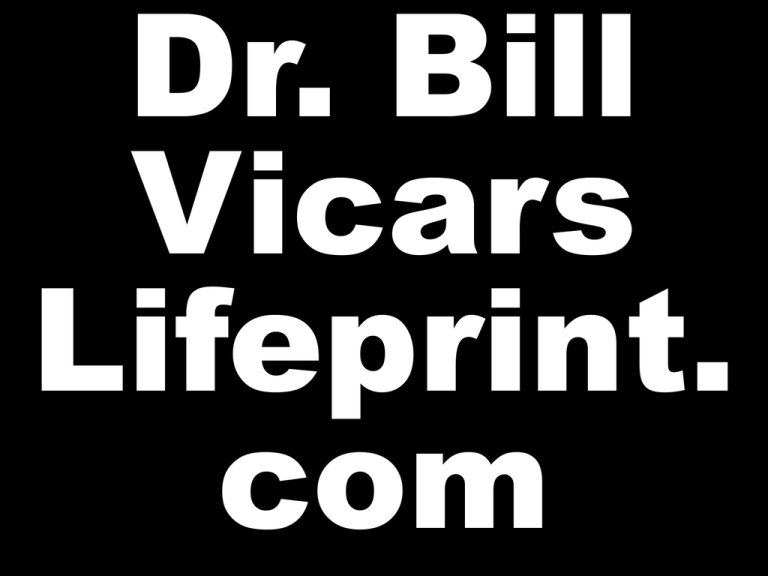
Dr. Bill Vicars Lifeprint. com ASL Linguistics: Semantics What is the sign for NAME? What is the sign for ROME? LIS = Italian Sign Language Lingua dei Segni Italiana Meaning is determined by… …a specific community of users. Determine d = decided = agreed Dictionary problem: Same sign / different glosses Can you think of any signs that have more than one English interpretation? Lets discuss types of meaning… 3 types of meaning … Referential Social Affective Referential meaning … idea, thing, state of affairs CAT = 4 legs, tail, whiskers, etc. The "cat" is a referent of the sign CAT. REFER = NAME(verb) REFER = LABEL - Social Meaning … Sign choices reveal social information where from male or female African American or Caucasian example: AWFUL Affective Meaning … Sign choices reflect your… feelings, attitudes, opinions Example: "fascinating research" vs… "boring old project" Shows your attitude affective = feelings Referential meaning = What Social meaning = Who Affective meaning = How feel Referential meaning = denotation Social and Affective meaning = Connotation Example: “dEAF” = denotation Example: DEAF = connotation What is a lexicon? A set of words known by users of a language. Lexicon = Vocabulary set What is a Lexical item? A word (or sign). The study of semantics includes considering … Relationships of meaning between “lexical items” (words or signs) Ways words are related in meaning Will teach you six ways. Consider: APPLE & CAR APPLE & CAR Are not related Consider: BLUE RED YELLOW GREEN ORANGE PURPLE …are types of what? COLOR BLUE, RED, etc. have a relationship with COLOR That relationship is called: 1. Hyponymy BLUE, RED, YELLOW, etc. are hyponyms COLOR is a hypernym Example: Sign Language: ASL, LSF, LIS, LSQ “hyper” means “over” or above. Is "RED" a color? Duh. I have a point. Consider: HAND & ARM Is a HAND an ARM? We are not discussing hyponymy. New type of meaning … The relationship between a hand and an arm is a: 2. Part/Whole Relationship Another example: PHONOLOGY and LINGUISTICS Note… RED is a type of color… HAND is a part of an arm. Phonology is not a type of linguistics. Phonology is a part of linguistics. So far we’ve talked about what two types of relationships between signs? 1. Hyponymy 2. Part/Whole New relationship… Consider: soda & pop sofa & couch Two words that mean the same thing are… Synonyms 3. Synonymy Consider however: “Denotative Synonymy” means … “Refer to the same thing.” Two signs can denote (or refer to) the same thing but have a different connotation (social or affective meaning). Can have different connotative meaning. Connotatively not synonymous Connotative = social and affective Connotative = who & how feel DEAF ("index" hand) & DEAF (A-5 hand) are denotatively similar (synonymy) but connotatively dissimilar. DEAF ("index" hand) & DEAF (A-5 hand) both refer to the concept of “not hearing” but the two signs are different in terms of WHO uses them and HOW the user feels about being “Deaf.” Are BED & #BED an example of Synonymy ???? Maybe at a basic referential level. But they tend to be used differently in actual conversation. BED & #BED are not synonymous at the sentence or conversation level. That means not synonymous at the "discourse" level. “Discourse" tends to mean the use of sentences or having a conversation. Can you think of another pair of ASL lexicon that has sign version and a lexicalized fingerspelling version? CAR and #CAR BUSY and #BUSY EARLY and #EARLY So far we’ve talked about what three types of relationships between signs? 1. 2. 3. 1. Hyponymy 2. Part/Whole 3. Synonymy New relationship… Consider: LARGE and SMALL They are opposite in meaning. 4. Antonymy = opposites There are two types of Antonymy Gradable & Nongradable Gradable = levels, degrees, relative Example: LARGER vs SMALLER Nongradable = one or the other but not both Example: PREGNANT ALIVE or DEAD Gradable: English uses “-er" Gradable: ASL often uses "depiction" Example: "LIMO" vs V W Bug THICK BOOK vs THICKER BOOK ASL Gradation may also use… Nonmanual signals ex: pursed lips / cha. and structure changes, ex: LIMO moves hands further. Consider: GOOD & BAD English GOOD/BAD phonological forms different ASL GOOD/BAD phonological forms similar Reversal of orientation for antonymy Examples … LIKE DON'TLIKE WANT DON'TWANT KNOW DON'TKNOW 1. 2. 3. 4. 1. Hyponymy 2. Part/Whole 3. Synonymy 4. Antonymy New Relationship … Consider: WIFE & HUSBAND TEACHER STUDENT AUNT NIECE 5. Converseness Converseness is sort of similar to antonymy Converseness happens in pairs often phonologically similar 1. 2. 3. 4. 5. 1. Hyponymy 2. Part/Whole 3. Synonymy 4. Antonymy 5. Converseness New relationship … 6. Metaphor Metaphor = extension of meaning Consider: Orientational Metaphor example… DEPRESSED TIRED THRILLED HAPPY Up = positive meaning Down = negative meaning Up = present (APPEAR ) Down = absent (DISAPPEAR) - Ontological means … ... relating to or based upon being or existence. The iconic nature of ASL … is ontological Signs (often) look-like what they are. A sign often looks like… …someth ing that exists. The sign ANALYSIS is … mapped to the sign DIGGING … which is mapped to … the real life act of digging. Ontological metaphors treat abstract… entities states and events as if they were objects. "Digging into your psyche." "FALLINTO an area of interest" "HOLDONTO that idea" - Structural Metaphor: Treat abstract concepts in terms of a more concrete concept. "Time is money." ASL ex: TIME"run out of" - Metaphor: 1. Orientational 2. Ontological 3. Structural 4. 4. Families of signs What signs can you do with an open-8 handshape? FEEL EXCITE DEPRESS PITY SICK SENSITIVE …other example … Can you think of some signs that seem related to “NOT”? DENY REFUSE BLAME SUFFER Metaphor: 1. 2. 3. 4. Metaphor: 1. Orientational 2. Ontological 3. Structural 4. Sign Families There are more types of meaning. Today we’ve discussed six. What are the six types of word “meaning relationships”? 1. Hyponymy 2. Part/Whole 3. Synonymy 4. Antonymy 5. Converseness 6. Metaphor Here is a way to remember those: CHAMPS Dr. Bill Vicars Lifeprint. com
